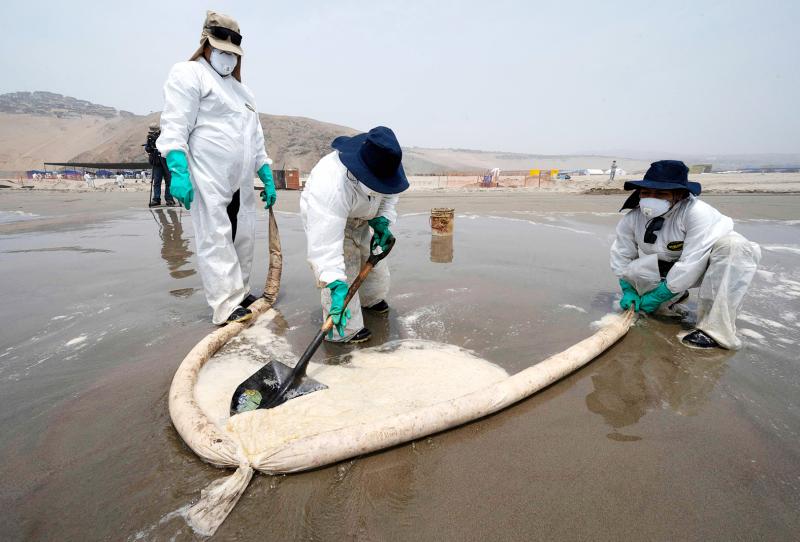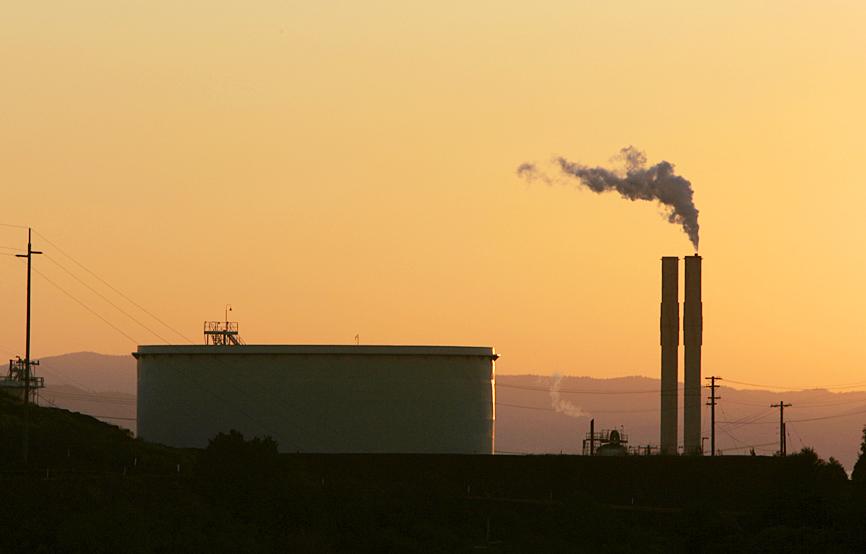Accusations of greenwashing against major oil companies that claim to be in transition to clean energy are well-founded, according to the most comprehensive study to date.
The research, published in a peer-reviewed scientific journal, examined the records of ExxonMobil, Chevron, Shell and BP, which together are responsible for more than 10 percent of global carbon emissions since 1965. The researchers analysed data over the 12 years up to 2020 and concluded the company claims do not align with their actions, which include increasing rather than decreasing exploration.
The study found a sharp rise in mentions of “climate”, “low-carbon” and “transition” in annual reports in recent years, especially for Shell and BP, and increasing pledges of action in strategies. But concrete actions were rare and the researchers said: “Financial analysis reveals a continuing business model dependence on fossil fuels along with insignificant and opaque spending on clean energy.”

Photo: AFP
Numerous previous studies have shown there are already more reserves of oil and gas and more planned production than could be burned while keeping below the internationally agreed temperature target of 1.5C. In May last year, the International Energy Agency (IEA) said there can be no new fossil fuel developments if the world is to reach net zero by 2050.
Oil companies are under increasing pressure from investors to align their businesses with climate targets. But their plans have faced scepticism, prompting the researchers to conduct the new research, which they said was objective and comprehensive.
“Until there is very concrete progress, we have every reason to be very sceptical about claims to be moving in a green direction,” said Gregory Trencher, at Kyoto University in Japan, who worked with Mei Li and Jusen Asuka at Tohoku University.

Photo: AP
“If they were moving away from fossil fuels we would expect to see, for example, declines in exploration activity, fossil fuel production, and sales and profit from fossil fuels,” he said. “But if anything, we find evidence of the reverse happening.”
“Recent pledges look very nice and they’re getting a lot of people excited, but we have to put these in the context of company history of actions,” Trencher said. “It’s like a very naughty schoolboy telling the teacher ‘I promise to do all my homework next week’, but the student has never worked hard.”
The new study, published in the journal PLOS One, found mentions of climate-related keywords in annual reports rose sharply from 2009 to 2020. For example, BP’s use of “climate change” went from 22 to 326 mentions.
But in terms of strategy and actions, the researchers found “the companies are pledging a transition to clean energy and setting targets more than they are making concrete actions.”
Chevron and ExxonMobil were “laggards” compared to Shell and BP, the researchers said, but even the European majors’ actions appeared to contradict their pledges. For example, BP and Shell pledged to reduce investments in fossil fuel extraction projects, but both increased their acreage for new exploration in recent years, the researchers said.
Furthermore, the analysis found Shell, BP, and Chevron increased fossil fuel production volumes over the study period. None of the companies directly releases data on their investments in clean energy, but information they provided to the Carbon Disclosure Project indicates low average levels ranging from 0.2 percent by ExxonMobil to 2.3 percent by BP of annual capital expenditure (capex). Separate analysis by the IEA indicates that investment in clean energy by oil and gas companies was about 1 percent of capex in 2020.
“Until actions and investment behavior are brought into alignment with discourse, accusations of greenwashing appear well-founded,” the researchers said.
A spokesperson for ExxonMobil said: “The move to a lower emission future requires multiple solutions that can be implemented at scale. We plan to play a leading role in the energy transition, while retaining investment flexibility across a portfolio of evolving opportunities, including for example carbon capture, hydrogen and biofuels, to maximize shareholder returns.”
A Chevron spokesperson said: “We are focused on lowering the carbon intensity in our operations and seeking to grow lower carbon businesses along with our traditional business lines. We are planning US$10 billion in lower carbon investments by 2028.”
Shell’s spokesperson said: “Shell’s target is to become a net zero emissions energy business by 2050, in step with society. Our short, medium and long term intensity and absolute targets are consistent with the more ambitious 1.5C goal of the Paris Agreement. We were also the first energy company to submit its energy transition strategy to shareholders for a vote, securing strong endorsement.”
A spokesperson for BP said: “In 2020 BP set out our new net zero ambition, aims and strategy, and in 2021 completed the largest transformation of the company in our history to deliver these. Because this paper looks back historically over the period 2009-2020, we don’t believe it will take these developments and our progress fully into account.”
Trencher rejected the charge that the analysis was out of date: “We included the documents that were published during 2021, so the so-called data gap is only about six months and we don’t find any evidence of any new actions that would change any of our findings.”
“Unfortunately, the way the energy markets are structured around the world, fossil fuels still enjoy many [regulatory and tax] advantages and renewables are still disadvantaged,” he said.

Jacques Poissant’s suffering stopped the day he asked his daughter if it would be “cowardly to ask to be helped to die.” The retired Canadian insurance adviser was 93, and “was wasting away” after a long battle with prostate cancer. “He no longer had any zest for life,” Josee Poissant said. Last year her mother made the same choice at 96 when she realized she would not be getting out of hospital. She died surrounded by her children and their partners listening to the music she loved. “She was at peace. She sang until she went to sleep.” Josee Poissant remembers it as a beautiful

Before the last section of the round-the-island railway was electrified, one old blue train still chugged back and forth between Pingtung County’s Fangliao (枋寮) and Taitung (台東) stations once a day. It was so slow, was so hot (it had no air conditioning) and covered such a short distance, that the low fare still failed to attract many riders. This relic of the past was finally retired when the South Link Line was fully electrified on Dec. 23, 2020. A wave of nostalgia surrounded the termination of the Ordinary Train service, as these train carriages had been in use for decades

Lori Sepich smoked for years and sometimes skipped taking her blood pressure medicine. But she never thought she’d have a heart attack. The possibility “just wasn’t registering with me,” said the 64-year-old from Memphis, Tennessee, who suffered two of them 13 years apart. She’s far from alone. More than 60 million women in the US live with cardiovascular disease, which includes heart disease as well as stroke, heart failure and atrial fibrillation. And despite the myth that heart attacks mostly strike men, women are vulnerable too. Overall in the US, 1 in 5 women dies of cardiovascular disease each year, 37,000 of them

Politically charged thriller One Battle After Another won six prizes, including best picture, at the British Academy Film Awards on Sunday, building momentum ahead of Hollywood’s Academy Awards next month. Blues-steeped vampire epic Sinners and gothic horror story Frankenstein won three awards each, while Shakespearean family tragedy Hamnet won two including best British film. One Battle After Another, Paul Thomas Anderson’s explosive film about a group of revolutionaries in chaotic conflict with the state, won awards for directing, adapted screenplay, cinematography and editing, as well as for Sean Penn’s supporting performance as an obsessed military officer. “This is very overwhelming and wonderful,” Anderson